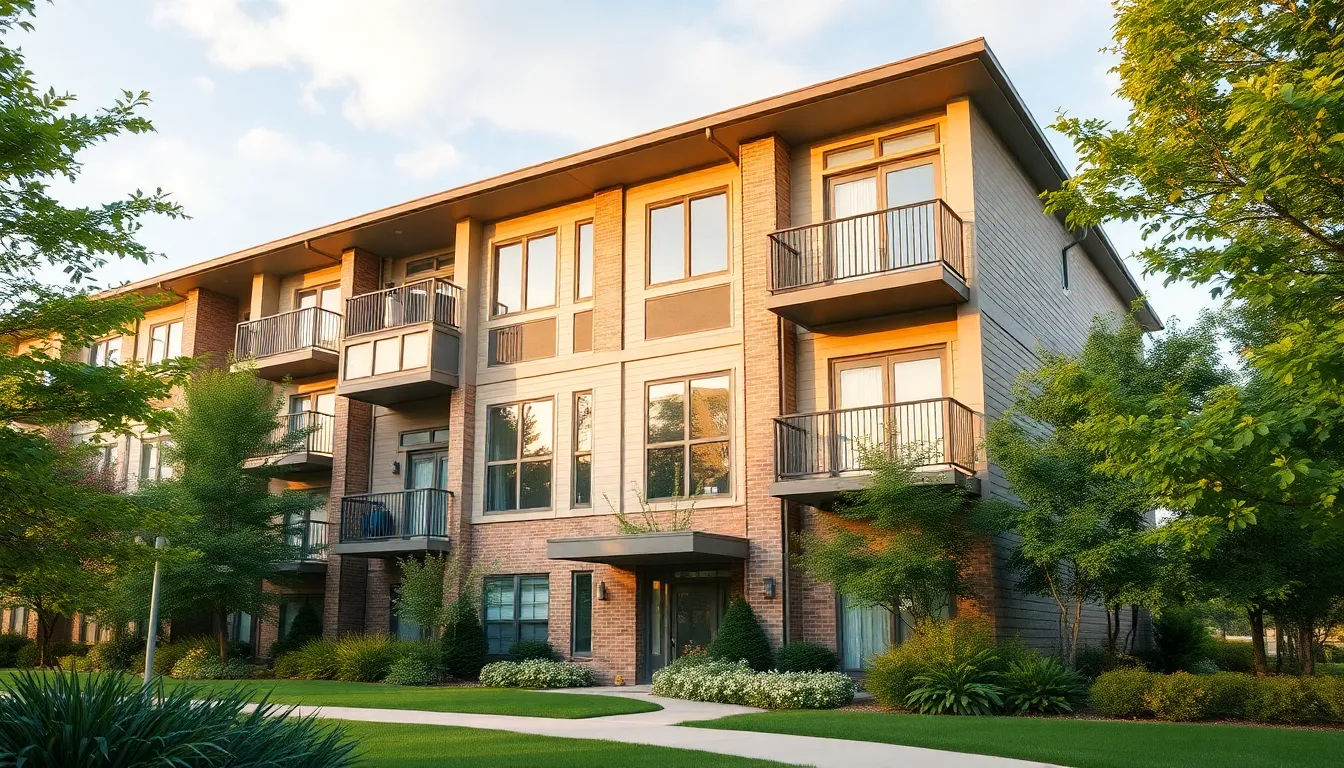Table of Contents
ToggleIn the great debate of buying a condo versus renting, many find themselves stuck in a real estate tug-of-war. Should one dive into homeownership and embrace the joys of mortgage payments and maintenance headaches? Or is it wiser to enjoy the flexibility of renting while dodging the responsibilities of property upkeep?
Picture this: a cozy condo where you can sip your morning coffee while gazing at the skyline, or a rented apartment with a landlord who thinks “emergency repairs” means waiting until next Tuesday. Each option has its perks and pitfalls, and the choice can feel as daunting as deciding what to binge-watch next. Whether he’s a first-time buyer or she’s a seasoned renter, understanding the nuances of each path can lead to a happier living situation. Let’s break down the pros and cons so you can make a decision that feels right for you.
Overview of Buying a Condo vs Renting
Buying a condo offers long-term investment potential. Ownership builds equity over time, allowing individuals to benefit from property appreciation. A monthly mortgage payment typically contributes to personal asset growth.
Renting an apartment provides flexibility and lower commitments. Individuals can choose short-term leases, making it easier to relocate for job opportunities or personal preferences. Maintenance responsibilities often fall on landlords, relieving renters of unexpected costs.
In terms of financial obligations, buying a condo requires upfront expenses. Closing costs, down payments, and property taxes may add significant initial costs. Ongoing expenses include mortgage payments and homeowner association fees.
Renters encounter simpler financial responsibilities. Monthly rent payments cover living expenses without additional costs. Security deposits serve as a safeguard for landlords, returning funds to tenants upon lease completion if no damages occur.
Additionally, lifestyle preferences influence the buying versus renting decision. Buyers often seek stability and personalization options within their space. Renters may prefer dynamic living conditions and amenities offered by rental communities.
Specific market conditions also impact the decision. In a seller’s market, purchasing may prove challenging due to high prices. Conversely, in a buyer’s market, favorable conditions allow for advantageous property acquisition.
Personal circumstances matter greatly in this choice. Individuals must assess their finances, lifestyle preferences, and future plans. Before deciding, evaluating both options and understanding their implications remains critical.
Advantages of Buying a Condo
Buying a condo offers several key benefits that appeal to many prospective homeowners. Such advantages include building equity and enjoying stability and control over living conditions.
Building Equity
Equity grows when a homeowner makes mortgage payments, which gradually increases ownership stake in the property. After several years, the potential for significant appreciation in property value can enhance this equity. Many individuals view equity as a long-term investment that can contribute to wealth creation. In contrast, renters don’t accrue equity; they pay for the right to use the property without gaining ownership. Additionally, homeowners can leverage equity for future financial opportunities, such as home improvements or investment in other properties.
Stability and Control
Stability often comes from owning a condo since mortgages generally involve longer-term commitments than rental leases. This long-term investment allows individuals to settle in a community, providing a sense of permanence. Homeowners can make personalized improvements to their living space, reflecting their tastes and preferences. Control over living conditions also extends to policies governing pets, renovations, and community amenities, giving homeowners the freedom to create their ideal environment. Renting, however, may limit such choices, depending on lease agreements and landlord regulations.
Advantages of Renting
Renting an apartment offers several advantages that appeal to a broad range of individuals. These benefits often make renting a more attractive option than purchasing a condo.
Flexibility
Flexibility stands out as a significant advantage for renters. Individuals can choose shorter lease agreements, allowing for easy relocation when personal or professional circumstances change. This adaptability suits those exploring new job opportunities or wanting to experience different neighborhoods. Renters often find freedom in deciding where they want to live without the long-term commitment tied to homeownership. They can quickly adjust their living situation based on lifestyle needs and preferences.
Lower Initial Costs
Lower initial costs further enhance the appeal of renting. Typically, renters incur fewer upfront expenses than buyers, who must handle closing costs and down payments averaging 6% to 7% of the property’s purchase price. Most renters only pay a security deposit—usually one month’s rent—and the first month’s rent, significantly reducing financial strain. Additionally, renting eliminates costs related to property taxes and homeowner association fees. This financial accessibility allows individuals to allocate funds toward other priorities, such as savings or personal endeavors.
Considerations for Buying a Condo
Buying a condo entails several important considerations that potential homeowners should evaluate. These aspects significantly influence the long-term satisfaction and financial viability of this investment.
Financial Commitment
Financial commitment features prominently when buying a condo. Buyers face upfront expenses that include closing costs and down payments, which can amount to thousands of dollars. Monthly mortgage payments follow, coupled with homeowner association fees that cover shared amenities and maintenance. Over time, these costs accumulate, impacting overall housing affordability. Interest rates also play a role, as higher rates can lead to significantly increased monthly payments. Individuals must assess their budgets carefully and be prepared for potential fluctuations in property taxes and insurance.
Maintenance Responsibilities
Maintenance responsibilities also differ between buying a condo and renting. Homeowners manage not only repairs within their units but also contribute to shared community upkeep. HOA fees often cover common area maintenance, landscaping, and utility bills, yet owners remain liable for personal repairs. Such responsibilities can become time-consuming and costly, depending on the property’s age and condition. Individuals considering a purchase should evaluate their willingness to handle these tasks, as well as their ability to invest in upgrades or renovations. Generally, prospective buyers must be ready for the ongoing commitment that homeownership entails.
Considerations for Renting
Renting provides flexibility for various lifestyle choices and financial situations. Individuals often evaluate lease terms and lifestyle factors before making a commitment.
Lease Terms
Lease terms typically range from six months to two years. These durations offer renters the option to move after a short period, accommodating job changes or personal preferences. Many landlords provide month-to-month leases, catering to those who require even more flexibility. Renters face less long-term commitment compared to homeowners, which allows for exploring different neighborhoods and adjusting living conditions as necessary. Such adaptability is advantageous for those seeking a dynamic living environment.
Lifestyle Factors
Lifestyle preferences significantly influence the decision to rent. Many individuals prioritize amenities like gyms, pools, and social spaces, which are often included in rental agreements. Community features enhance the living experience, appealing to those who value social interaction and convenience. Renters may also appreciate lower maintenance responsibilities, as landlords usually handle repairs and upkeep. This ease allows individuals to focus on personal pursuits rather than home maintenance. Ultimately, renters often seek environments that align with their current lifestyles while leaving room for future changes.
Conclusion
Choosing between buying a condo and renting requires careful consideration of individual circumstances. Each option offers unique benefits and challenges that cater to different lifestyles and financial situations. Buyers may enjoy the stability and long-term investment potential that comes with ownership while renters appreciate the flexibility and lower initial costs of leasing.
Ultimately the decision hinges on personal goals and preferences. Those seeking long-term stability and the ability to personalize their space may lean towards buying. Conversely individuals valuing flexibility and minimal responsibilities might find renting more appealing. By weighing these factors thoughtfully one can make a choice that aligns with their current needs and future aspirations.









